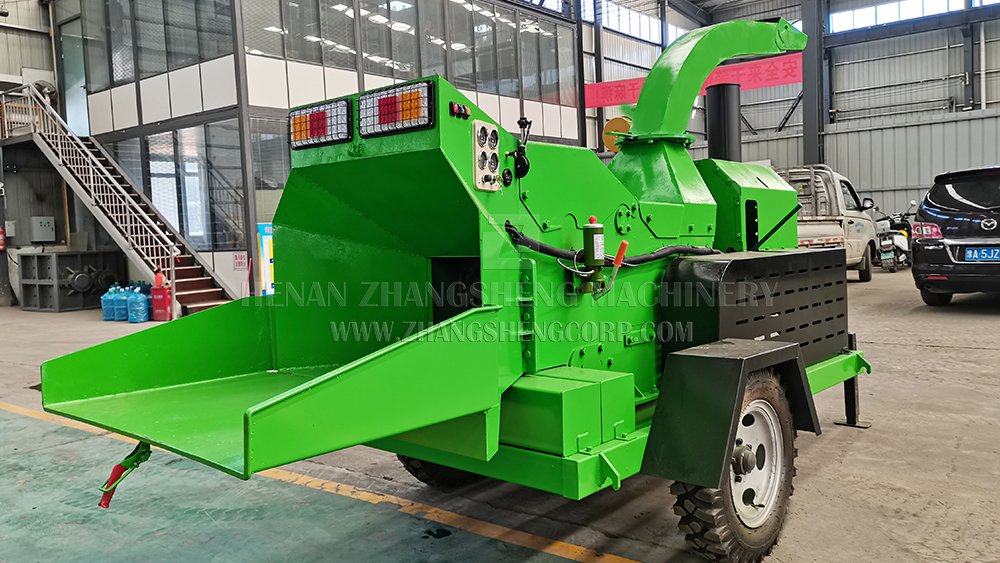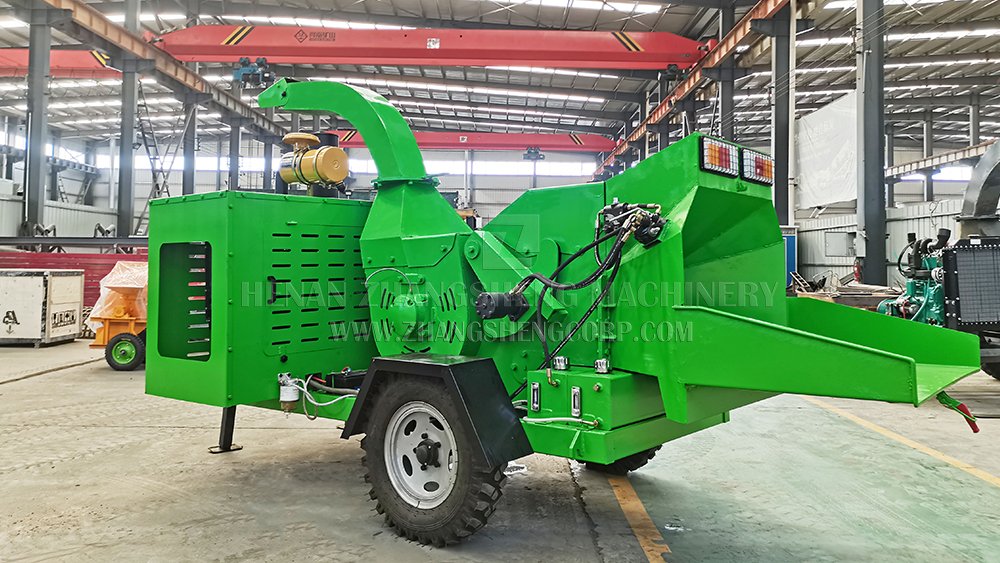You own a wood chipper, a true workhorse that turns piles of brush into usable chips. But what happens when it stops working as it should? Regular maintenance is not just good practice; it is essential for keeping your machine running smoothly and safely.
To maintain a wood chipper effectively, you must perform daily checks, regularly inspect and sharpen or replace blades, service the engine according to manufacturer guidelines, keep it clean, and lubricate moving parts. This routine care ensures optimal performance, extends the machine's lifespan, and helps prevent unexpected breakdowns during operation.
Working for zhangsheng for 22 years, I have seen our robust machines tackle countless jobs. I also know that even the best equipment needs proper care. A well-maintained chipper is not just efficient; it is safer. Let us go through the steps needed to keep your wood chipper in top shape.
How do you maintain a wood chipper?
You rely on your wood chipper for processing tough materials. But if you ignore its needs, it will eventually let you down, possibly at the worst time. So, what specific actions should you take to keep your chipper in peak condition?
Maintaining a wood chipper involves a regular schedule of tasks: daily pre-operation checks, routine inspections of blades and belts, engine servicing, consistent cleaning, and proper storage. These steps prevent wear and tear, identify issues early, and ensure the machine operates efficiently and safely.

From my experience seeing our machines in action, from small Landscaping & Tree Care Companies to large Forestry & Logging Companies, effective maintenance begins with a proactive approach. Every time you are about to use the chipper, you should do a quick visual inspection. Check for any loose bolts, worn hoses, or unusual leaks. Ensure all guards are in place and secure. Our machines feature a smart control panel which shows key working conditions like oil level and water temperature . This helps you find issues early, which minimizes maintenance efforts . After each use, it is important to clear out any wood debris from around the cutting drum and feed rollers. This prevents buildup that can lead to clogs or strain on the engine. I remember one customer telling me about a time his chipper started making strange noises, only to find a large amount of packed sawdust had accumulated under the housing, causing excessive vibration. Regularly, you need to inspect the chipper blades. Dull blades make the engine work harder, reduce chipping efficiency, and produce poor quality chips. Our cutting drums rotate at up to 2200 rpm , showing the precision and force involved, so sharp blades are critical for optimal performance. If the blades are chipped, dull, or nicked, they need to be sharpened or replaced. This can be done by flipping them to use the other cutting edge if designed that way. Belts and hoses also need checking for cracks, fraying, or proper tension. The engine, whether a high-quality Chinese diesel or a global brand like Cummins or Perkins, requires its own specific service, including oil changes, air filter cleaning/replacement, and fuel filter changes . You can easily buy parts and get repairs done for these major brands . These steps are crucial for the long-term health of your machine.
Key Aspects of Wood Chipper Maintenance
| Maintenance Area | Specific Tasks | Why It Matters |
|---|---|---|
| Daily Checks | Visual inspection for loose parts, fluid levels (oil, coolant), debris removal. Smart control panel review . | Prevents immediate operational failures and catches minor issues before they worsen. |
| Blade Care | Inspect for dullness/damage, sharpen or replace as needed. | Ensures efficient chipping, reduces engine strain, improves chip quality. |
| Engine Maintenance | Oil changes, air filter, fuel filter, spark plugs (gasoline). (For our diesel engines, parts are easy to get .) | Ensures reliable power, extends engine life, maintains fuel efficiency. |
| Belt & Hose Checks | Inspect for wear, cracks, proper tension. | Prevents power loss and hydraulic leaks, ensures proper function of components. |
| Lubrication | Grease bearings and pivot points according to manual. | Reduces friction, prevents wear, extends lifespan of moving parts. |
| Cleaning | Remove wood debris from cutting drum, feed rollers, and engine area. | Prevents clogs, overheating, and corrosion. |
| Storage | Store in a dry, protected area; prepare for long-term storage if needed. | Prevents rust, protects components from elements. |
Following this detailed approach will make sure your chipper is always ready for work.
How often do you grease a chipper?
You know lubrication is important for any heavy machinery. But how often should you actually grease your wood chipper? It can be tricky to know the right frequency without overdoing it or neglecting it.
The frequency for greasing a wood chipper depends on its usage intensity, the type of grease used, and the manufacturer's specific recommendations, which are always detailed in the machine's operational manual. For general use, weekly or bi-weekly greasing of critical points like bearings and pivot points is often a good starting point.

From my perspective at zhangsheng, making equipment that lasts, lubrication is a small but mighty part of maintenance. There is no one-size-fits-all answer for greasing frequency because of how diverse our customers' operations are. For example, a Landscaping & Tree Care Company using a portable chipper every day will need to grease it more often than a Large Farm using it only occasionally for seasonal cleanup. The machine's manual provides the precise schedule and types of grease recommended for specific points, such as the bearings in the feed rollers, the main drum shaft, and any pivot points on the discharge chute or feeding system. I often tell customers that if they are operating their chipper for several hours a day, especially under heavy load, they should consider checking and greasing critical points at least once a week. This ensures that friction is minimized, preventing premature wear of components and costly repairs down the line. I once had a customer who called about a squealing noise from his chipper's feed rollers. It turned out he had simply forgotten to grease them for months. A quick lubrication solved the problem, but if left unaddressed, it could have led to bearing failure and much bigger issues. Always use the specified type of grease, as mixing different types can sometimes cause more harm than good. Also, clean the grease fittings before applying new grease to prevent dirt from entering the bearings.
Greasing Guidelines for Wood Chippers
| Factor | Impact on Greasing Frequency | Common Greasing Points |
|---|---|---|
| Usage Intensity | High usage (daily, heavy loads) requires more frequent greasing. | Feed roller bearings |
| Low usage (weekly, light loads) allows less frequent intervals. | Main drum shaft bearings | |
| Environment | Dusty, wet, or dirty conditions may require more frequent checks. | Pivot points on discharge chute or other moving parts |
| Manufacturer's Manual | Always the primary source for specific schedules and grease types. | (Always refer to your specific machine's manual for precise points and frequency.) |
| Visual/Auditory Cues | Squeaking, grinding, or excessive heat can indicate need for lubrication. |
Paying attention to these details will ensure all critical components are well-lubricated.
Are wood chippers high maintenance?
You are considering buying a wood chipper, or maybe you already own one. You might worry about how much time and effort it will take to keep it running. So, are wood chippers truly high-maintenance machines?
Wood chippers require consistent and diligent maintenance, but they are not inherently "high maintenance" in terms of complexity if you follow a routine. Their need for regular care stems from the demanding work they perform, processing abrasive wood materials. Modern chippers, like ours at zhangsheng, feature designs and systems that simplify maintenance and extend service intervals.
In my 22 years at zhangsheng, I have seen the evolution of wood chipper design. While they are robust, they operate under very demanding conditions: processing tough, abrasive wood, often with significant shock loads to the cutting drum and engine . This nature of work naturally means components will wear over time. So, yes, they demand attention, but it is more about regularity than difficulty. For example, our horizontal hydraulic forced feeder system and smart feeding system are designed to reduce strain on the machine, which helps reduce wear on components. Our user-friendly controls allow for quick stops or reversals if a jam occurs, protecting the blades and engine . The smart control panel keeps you informed about key operating conditions like oil level and water temperature, helping you identify problems early and minimize maintenance . We also offer engines from global brands like Cummins and Perkins, which are known for their reliability and ease of getting parts for service . These features are built to simplify the owner's maintenance tasks. Compared to more complex industrial machinery, a wood chipper's maintenance is quite straightforward: primarily routine inspections, lubrication, blade care, and engine servicing. The true cost of "high maintenance" often comes from neglect, leading to expensive repairs. A customer of ours who owns a large equipment rental company once told me that the chippers he rents out and maintains regularly almost never have major issues, while the ones returned by clients who clearly skipped maintenance always need significant work. This emphasizes that consistent, simple care prevents major headaches.
Factors Influencing Wood Chipper Maintenance Effort
| Factor | Impact on Maintenance Effort | zhangsheng Advantage |
|---|---|---|
| Nature of Work | Processing abrasive, high-impact materials naturally causes wear. | Robust design and quality components for durability. |
| Operator Habits | Consistent routine checks and cleaning reduce wear. | User-friendly controls , Smart Control Panel . |
| Machine Design | Features that simplify maintenance and protect components. | Hydraulic forced feeder , Smart feeding system . |
| Engine Quality | Reliable engines require less frequent major overhauls. | Top-tier diesel engines like Cummins, Perkins, Huadong, Weichai . |
| After-Sales Support | Access to professional help for troubleshooting and parts. | 24/7 after-sales support team, engineers fluent in English [from company info]. |
With regular, diligent care, your wood chipper will provide reliable service for many years.
Conclusion
Proper wood chipper maintenance is key for its longevity and performance. It involves regular checks, blade care, and engine servicing, with greasing frequency depending on use. While they require consistent attention, modern chippers are designed to make this maintenance manageable and straightforward.


